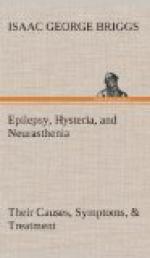Most men eat six times the minimum and twice the optimum quantity of food per day. For every one who starves, hundreds gorge themselves to death. “Food kills more than famine”, and the poor, who eat sparsely from necessity, suffer far less from gout, cancer, rheumatism and other food-aggravated diseases than the rich.
Most books give detailed lists of foods to be eaten and to be avoided, but this we believe is productive of little good.
Let the patient eat a mixed diet, well and suitably cooked, taking what he fancies in reason, masticating everything thoroughly, and gradually eliminating foods which experience teaches him are difficult for him to digest.
* * * * *
CHAPTER XIV
CONSTIPATION
“Causing a symptom to disappear
is seldom the cure of
any ill; the true course is to prevent
the symptom.”
Rings of muscle cause wormlike movements of the bowels, and so propel forward food and waste. Weakening of these muscles or their nerve controls from any cause, results in a “condition of the bowels in which motions occur only when provoked by medicines or injections”. In some cases though motions occur freely, food ingested is retained too long in the digestive tract.
The blood extracts what water it needs from the fluid waste in the large bowel, but when the weak muscles allow this to remain too long, an excess of moisture is removed, leaving hard, dry masses, painful to pass.
When the faeces reach the anus, they cause an uneasy feeling, which directs us to seek relief, but if we neglect this impulse the bowel may become so insensitive that it ceases to warn its owner of the need to evacuate. Meantime, the muscles which expel the faeces get weak, so that every motion needs a strong effort of will, and much harmful straining.
Much misery is caused by false modesty in the presence of others. It can never be immodest to attend to the calls of Nature, and such hypersensitiveness is dangerous, for rupture, piles, fissure, prolapse, fistula, are often due to straining.
Lack of exercise weakens the intestinal and abdominal muscles. Unsuitable or imprudent foods or drinks, indigestion, excessive worry, and anything that lowers the general health tend to produce constipation.
Bacteria flourish freely in faeces, and though it is doubtful whether the “Auto-intoxication” so freely ascribed to them, is supported by facts, it cannot be doubted that, whatever the precise mechanism by which the effects are produced, constipation does result in a lowering of the resistance to disease. More frequent fits, colic, foul breath, headache right across the forehead, lost appetite, drowsiness, skin eruptions, irritability, insomnia, melancholia and anaemia (especially the “green sickness” of women, usually connected with menstrual irregularities) are but a few of many ills partly or wholly due to or consequent upon constipation.




